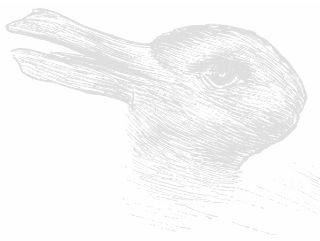At first I was baffled.
I couldn't remember waking up. Colors had simply arrived at some point and I found myself in my patrol car, heading here.
On the way, I got a call-a domestic dispute. I couldn't ignore it. I was closest. I had to respond. People don't care about a good pilgrimage anymore. My arms hoisted the wheel to the left. I turned into a small neighborhood. Grotesque statues stood atop the marble columns framing the entrance. Children were staging a performance of Goethe's Faust in one yard. In another, a family shoveled dirt onto an old man. He seemed undisturbed. I came to a house. A scarecrow languished on a cross in the garden; it protected small crops of cannabis and rice. Walking up the path, I heard shouting. The windows were open. The walls were thin.
The steps leading up to the porch spoke-with every footfall, a phoneme:
"An everlasting country."
Dismantled bicycles laid in a pile on the porch. I knocked. The voices stopped. Locks unlocked-slides, clicks, whistles, grinding steel. A woman threw open the door and stood in a small breezeway. Behind her stood a man.
"Hi," she said. "Can I help you?"
"Yeah. I got a call," I said, looking past her. "You two were yelling pretty loudly."
She sighed. "Sorry. We were just arguing. That's all."
"Well," I said. "Is there anything I can do?"
"No, that's okay-"
"Yes," the man said, pushing her out of the way. "I know exactly how you can help."
He grabbed my arm and led me inside. We walked down the hallway. Hanging on the wall was a framed photograph of Barnabas of Gethsemane. Lights flickered as we entered the kitchen. The woman told me that it always happens-nothing to worry about. At the stove was an old man stirring a boiling pot. The scent of wisteria flooded over the sides of the cauldron and hissed in the flames. A chamber orchestra played in another room. The oboe squealed. A thud followed. The oboe went silent. In the kitchen, the man held up an illustration of the duck-rabbit illusion.
"Is this a duck or a rabbit," he asked.
"Would you stop," said the woman. "We're really sorry about all of this."
"No," he said. "This is important. I want an answer."
"It's not a problem," I said to the woman. I looked over my shoulder at the person stirring the pot. The smell had changed. I couldn't place it but my lungs felt as though they were full of smoke. I looked back at the man and the woman. He still held up the drawing. "The philosopher Ludwig Wittgenstein uses this illusion to discuss what he calls noticing an aspect," I said. "This refers to the fluidity of perception and, thus, of the linguistic sign-the ability possessed by humankind to discern multiple meanings from a sign by utilizing and measuring it against a catalogue of concepts and theories we accrue as we maneuver through life."
"So which one is it," the man asked. "Duck or rabbit?"
"It's both," I said. "But we can only ever perceive it as one or the other."
He stared at me, then at the woman.
The person behind me began to laugh.
"Oh, I'll bet you love that," he said to the woman.
She scoffed.
My job being done, I started to turn around. As I did so, the pianist must have hit the wrong note-a flatted fifth instead of a perfect. Thud-like an old drum. The piano stopped. The lid on the pot rattled. The voices grew louder behind me. Phonemes sounded from the floor-something about locusts eating the fruitage of our ground, firstborns, silver and gold. Steam filled the room. I heard knocking at the door and sirens outside. I heard something about bread, and drawing water from a stone. I stumbled over the threshold into the hallway. The lights flickered and went out.
For an instant, I saw the image of a moth flying into a burning lightbulb, dust lifting from its sputtering wings every time it hit the glowing glass.







